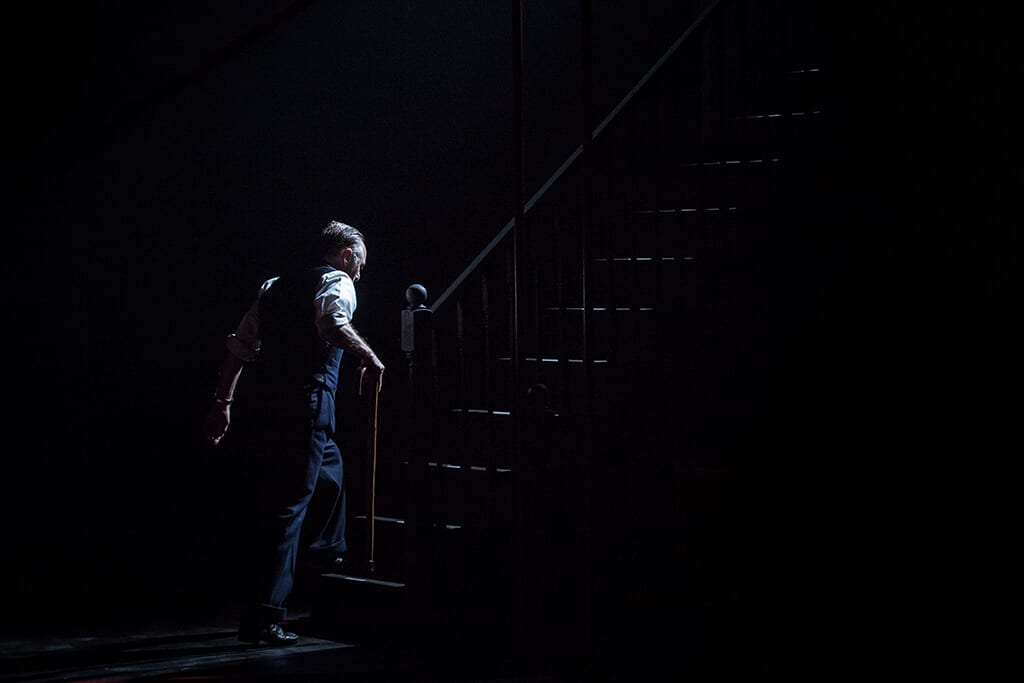In this 50th anniversary revival, Jamie Lloyd ramps up the tension and presents Pinter’s family drama The Homecoming as a true psychological thriller. If the rock n roll soundtrack evokes nostalgia, this is quickly undercut by the sparse 60s décor of a stripped back living room sharply framed by a red cage. Soutra Gilmour’s design adds focus to an already taught production, the red lines drawing the eye towards the central door at the back of the room like perspective lines an artist forgot to rub out. It’s vaguely claustrophobic before anyone steps on stage but palpably so once they do.
First through the door is Machiavellian Lenny (John Simm), a pimp, looking extra devilish in the red glows and flashes of Richard Howell’s lighting. As the family gather, the atmosphere bubbles with antagonism. The ageing patriarch Max (Ron Cook), an ex-butcher and Cockney wheeler-dealer, shuffles about the room trying to retain his dominance over grown-up sons Lenny and Joey (John Macmillan), a part time boxer. Though they bow to his aggressive control, they’ve certainly neither forgotten nor forgiven the abuse that lurks in their past. Add to this bitter, toxic mix the figure of a resented camp uncle, Sam (Keith Allen), and the room soon becomes stiflingly crowded with men and their long shadows. It’s clear that the tearing down of a partition wall for an open-plan living area wasn’t the only drastic change to the home after Max’s “slut” wife died. Starved of feminine presence, the front room is an arid landscape and a battleground. As the men circle each other playing games of one-upmanship and trading threats, we wait in tense anticipation for the war to begin.
Instead of a spontaneous combustion of testosterone, the door is opened to prodigal son Teddy (Gary Kemp), returning to his working class London roots on his way back to American academia after a holiday in Europe. Taking their suitcases upstairs to his childhood bedroom, Teddy promises that he and his beautiful new wife Ruth (Gemma Chan) will only be staying for a few days. But fate and the family have other ideas.
The Homecoming is a play with problematic gender politics to say the very least and once Lenny and Max really start spouting misogyny it’s a relief that Lloyd has kept the piece firmly period, allowing us some distance from the accounts of violence towards women and their routine degradation as “sluts” and “whores”. Ruth barely bats an eyelid at either of the family’s dominant figures, remaining every bit as cool and collected as Chan’s robot character in Channel 4’s ‘Humans’. Seemingly glad to be free of her stuffy Stateside life as a philosophy professor’s pretty bride, Ruth begins to fight the psychological war on her in-laws’ terms. She’s utterly uncanny: ruthless, sexy, and subtly calculating. The great mystery of the play – why on earth she would choose to stay in the repressive family home with a pimp, a butcher and a boxer – isn’t resolved but the events leading up to Ruth’s victory/submission play out in such a way that the play has you firmly in its grip from start to finish. The performances are brilliant all round, particularly from Gemma Chan and John Simm, all intense and interrogative studies of complex characters sketched out against the brilliantly conceived background of set, lights, and goosebump-raising sound. The Homecoming is an uncomfortable watch, certainly, but a dark and delicious piece of theatre.



